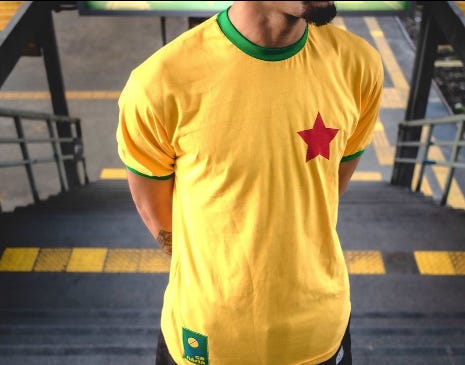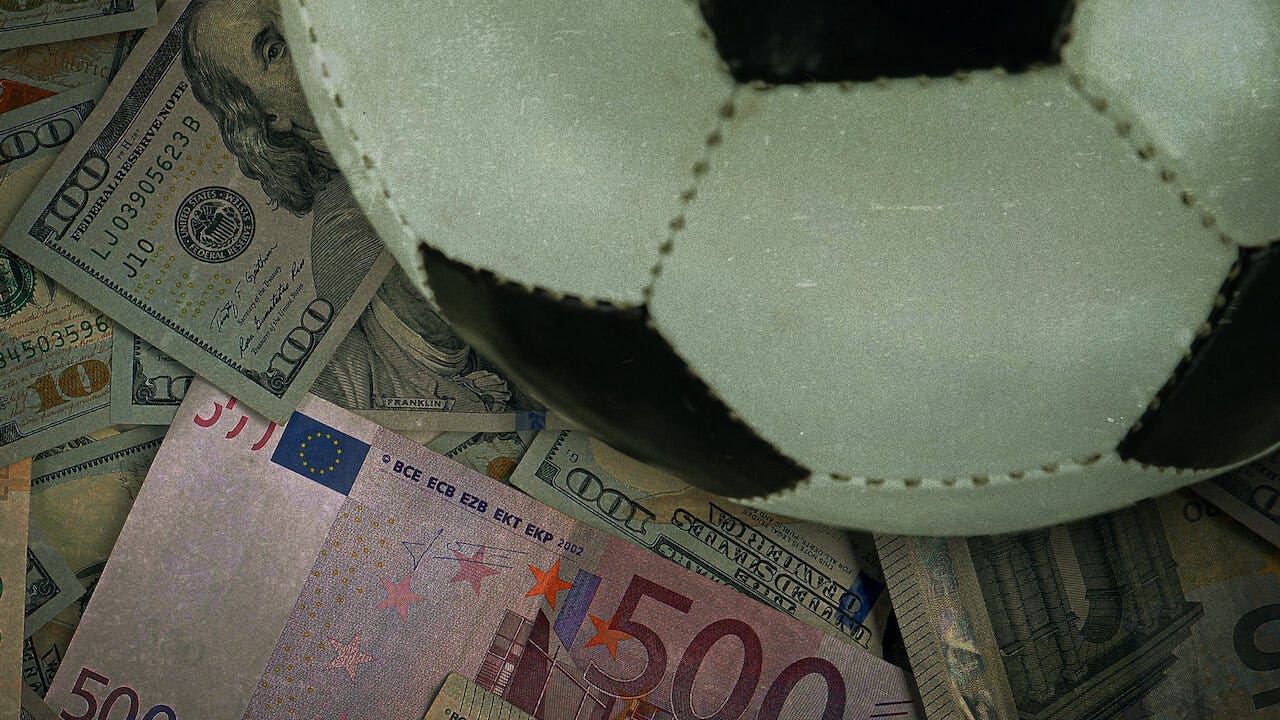Notes From The Week #19
Week 47: 21 November - 27 November
Yo. Welcome back. Hope you’ve all had a good week. I wanted to compound two thoughts that I’ve been having after watching the FIFA Uncovered documentary on Netflix (which is absolutely fantastic!). Football is more than a sport—it’s the world’s beautiful game. It’s a great unifier in a divided world and we’re seeing that in real-time in the stadiums of Qatar. However, with such an influential medium comes the ability for it to be leveraged and used for more controversial uses. This week we’ll be exploring two ways in which the beautiful game is leveraged in such a way.
Brazil’s Political Jersey
Since the inception of the World Cup just under a century ago—no nation has been as successful as Brazil. Brazil have won the World Cup five times: Sweden 1958, Chile 1962, Mexico 1970, USA 1994 and most recently South Korea/Japan 2002. The yellow jersey of Brazil’s national football team is a staple for football fans across the world. For many fans of the sport, it is a symbol the beautiful game. The flair, excitement and passion that fans love about football can be seen in full force when the Samba Boys play in the eye-catching yellow jersey. It’s been a symbol of national pride and international belief.
The yellow jersey which is also known as the canarinho jersey has not always been the Brazil national team’s shirt. The shirt was actually designed in 1953, three years after the World Cup Final heartbreak in which Brazil were defeated 2-1 by Uruguay in a World Cup that was hosted by Brazil. Prior to the designing of that shirt the national team wore white.
The jersey reminds fans all over the world of the iconic players that have donned the jersey over the years. Some of the greatest players to have ever touched a football the likes such as Pele, Romario and Ronaldinho. With such powerful symbolism, meaning and respect it makes sense why political factions have sought to leverage it as a means of pushing forward their agenda. Over the last few years the shirt has been adopted by the current President Jair Bolsanaro1 and his right-wing supporters in the run up to his 2018 election win, forcing a huge number of Brazilians to give up on the jersey. Political commentators observed the fact that the same iconic moments of Brazilian football are being used off the pitch to promote ideas antithetical to the unity that made the national team, and the country, famous. The broad adoption of Brazil’s national colours by the right started originally in 2015 during protests against the government of Lula’s ally Dilma Rousseff, and have since become de-facto symbols of Bolsonarismo2.
“Football is for everyone, I don’t like it [the jersey] being used by people who promote racism, sexism and discrimination”
Ademir Takara, Historian at the Museum of Football in Sao Paulo
Even with the disdain and angst against the use of the canarinho jersey to promote political ideologies, Brazil are still playing in the jersey in Qatar and from the looks of the fans in attendance—they also are. However, some Brazilians in Qatar have been embracing alternative versions of the amarelinha. A favourite amongst some fans has been the line of shirts provided by Revolta Canária. The line of yellow and green T-shirts modelled on the retro version of the canarinho jersey features progressive symbols like the red star of President-elect Lula’s Workers’ party. While it seems there is still a lot of work to be done to heal Brazil’s deeply divided society—I hope they are provided with some respite as all Brazilians unite together in support of Neymar and co.
An Alternative Understanding of Corruption
As mentioned earlier I spent some of my weekend watching the FIFA Uncovered series on Netflix. I’m on the last episode and it’s been absolutely astonishing to be provided with a look into FIFA and the scandals that have rocked the organisation over the last twenty years. I was particularly interested in how bids for the opportunity to host the World Cups were won. As I was watching I couldn’t help but reframe my understanding of corruption and distinguish between individual gain and community/national benefit. While both, in most instances, are irresponsible and bad practice it provides a helpful framework for us to consider contexts in which such practices are commonplace.
When Chinua Achebe’s characters in A Man of the People don’t seem to bat an eyelid at the fact their leaders are thieves. I remember at the time of reading being strongly annoyed. I remember this passage made me particularly upset:
“They were not only ignorant but cynical. Tell them that this man has used his position to enrich himself and they would ask you –as my father did — if you thought that a sensible man would spit out the juicy morsel that good fortune placed in his mouth.”
Their anger seemed to be aroused when the portion their leaders amassed disingenuously, was not in some way brought back to their community or village.
“We know they are eating,’ he said, ‘but we are eating too. They are bringing us water and they promise to bring us electricity. We did not have those things before; that is why I say we are eating too.”
Navigating the system in which you are born is basic survival. It’s commendable that Achebe developed some characters who were staunchly anti-corruption. It removed any depiction of his characters as passive agents and proponents of disingenuous practices. However, with a further deep dive, I soon recognised that even those beliefs were built on a privilege that is not usually provided to all — in the case of, the protagonist, Odilli — a university education.
Olu Oyinbo was a term that Nigerians referred to the government as ‘white man’s business’ it was from this understanding that anyone who was fortunate enough to receive a role in the government — which was seen as an extension of the colonial power; had a role of distributing funds/resources back to their communities. However, even in the appropriation of funds, there was still an etiquette that was to be understood. One of the passages that had the most profound impact on me is situated in Chapter Nine:
“But the most ominous thing I heard was from Timothy, a middle-aged man, who was kind of Christian and a carpenter. ‘Josiah has taken away enough for the owner to notice, ‘he said again and again.’
It was not an issue for you to take just as long as what you took did not leave a chasm that could probe questioning. Thievery’s discretion. However, when we look at the facts it seemed that somewhere along the line that greed broke any discretion that may have been informally understood. As history has shown we, human beings, don’t tend to manifest our vices modestly for too long. A little taken here and a little taken there will unequivocally always amount to much.
The FIFA Uncovered series has shown me that this is not something limited to fictional African countries on the cusp of civil war. It extends to the concrete reality of some of the most powerful nations in the world. France’s leverage of Michel Platini to ensure Qatar were provided with a vote by UEFA was a perfect realist example in ensuring that national interests are considered in decision-making processes about where a World Cup should be held. It provides a cautionary tale that if you do decide to take don’t take to the extent the owner notices—but our vices always manage to convince us that perhaps this time things may play out differently for us.
Until next week. Peace.
At the time of writing this post Jair Bolsonaro is currently the President of Brazil. January 2023 will see the inauguration of Luiz Inácio Lula da Silva as President of Brazil.
Bolsonarism is the predominant ideology of the Bolsonaro government and is associated with the rhetoric of defense of the family, patriotism, conservatism , authoritarianism, neo- fascist elements, anti- communism, scientific denialism, carrying weapons, rejecting human rights and aversion to the political left.




